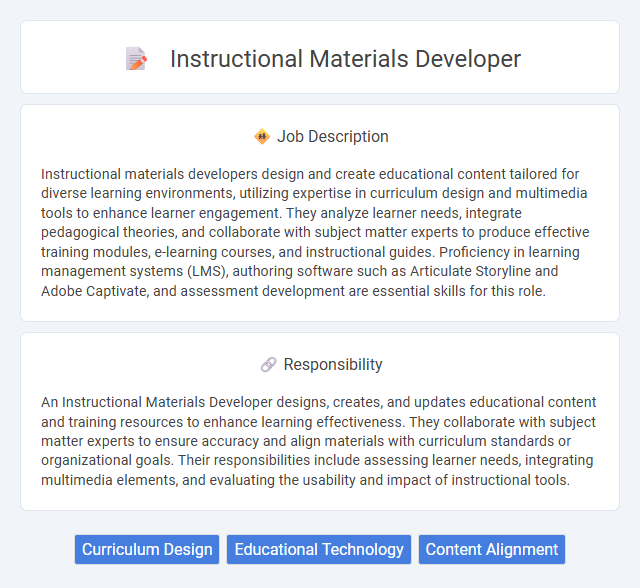
Instructional materials developers design and create educational content tailored for diverse learning environments, utilizing expertise in curriculum design and multimedia tools to enhance learner engagement. They analyze learner needs, integrate pedagogical theories, and collaborate with subject matter experts to produce effective training modules, e-learning courses, and instructional guides. Proficiency in learning management systems (LMS), authoring software such as Articulate Storyline and Adobe Captivate, and assessment development are essential skills for this role.
Individuals with strong creativity, attention to detail, and an aptitude for educational technology are likely to be well-suited for the role of an instructional materials developer. Those who are comfortable working collaboratively with educators and can adapt to evolving curriculum standards may find higher success probabilities in this position. Candidates lacking patience for iterative feedback or experience designing engaging learning content could face challenges in meeting job demands.
Qualification
Instructional materials developers require a strong background in education, instructional design, or related fields, often supported by a bachelor's or master's degree. Proficiency in curriculum development, learning theories, and multimedia tools like Adobe Creative Suite or Articulate 360 is essential. Experience with e-learning platforms, content management systems, and strong analytical skills to assess learner needs further enhance qualification for this role.
Responsibility
An Instructional Materials Developer designs, creates, and updates educational content and training resources to enhance learning effectiveness. They collaborate with subject matter experts to ensure accuracy and align materials with curriculum standards or organizational goals. Their responsibilities include assessing learner needs, integrating multimedia elements, and evaluating the usability and impact of instructional tools.
Benefit
Instructional materials developers likely enhance learning outcomes by creating tailored educational resources that meet diverse learner needs. Their expertise probably supports organizations in delivering consistent and effective training, which may lead to improved employee performance and satisfaction. This role could offer professional growth opportunities in educational technology and content design, contributing positively to career advancement.
Challenge
Instructional materials developers likely face the challenge of constantly adapting content to meet diverse learner needs and evolving educational technologies. Balancing creativity with curriculum standards might require significant problem-solving and innovation. Navigating tight deadlines and collaborating with subject matter experts could add a layer of complexity to the role.
Career Advancement
Instructional materials developers enhance educational experiences by designing effective learning resources tailored to diverse audiences and industries. Career advancement in this field often involves gaining expertise in multimedia design, curriculum development, and e-learning technologies, leading to roles such as senior instructional designer or education technology manager. Pursuing certifications like Certified Professional in Learning and Performance (CPLP) and mastering tools like Articulate Storyline or Adobe Captivate significantly boost promotion opportunities and salary potential.
Key Terms
Curriculum Design
Instructional materials developers specializing in curriculum design create comprehensive educational programs tailored to specific learning objectives and standards. They analyze content requirements, educational goals, and learner needs to develop structured lesson plans, assessments, and multimedia resources. Expertise in pedagogical theories and alignment with accreditation criteria ensures effective and engaging curriculum frameworks.
Educational Technology
Instructional materials developers specializing in educational technology design and create digital resources and interactive learning tools that enhance curriculum delivery and student engagement. They utilize learning management systems, multimedia software, and data analytics to tailor instructional content for diverse learner needs and optimize educational outcomes. Expertise in instructional design models such as ADDIE or SAM ensures the development of effective, technology-integrated educational materials aligned with pedagogical standards.
Content Alignment
Instructional materials developers ensure content alignment by designing educational resources that meet specific learning objectives and standards. They integrate curriculum frameworks and assessment criteria to create cohesive, effective teaching tools. Accurate alignment enhances learner engagement and improves knowledge retention across diverse educational settings.
 kuljobs.com
kuljobs.com